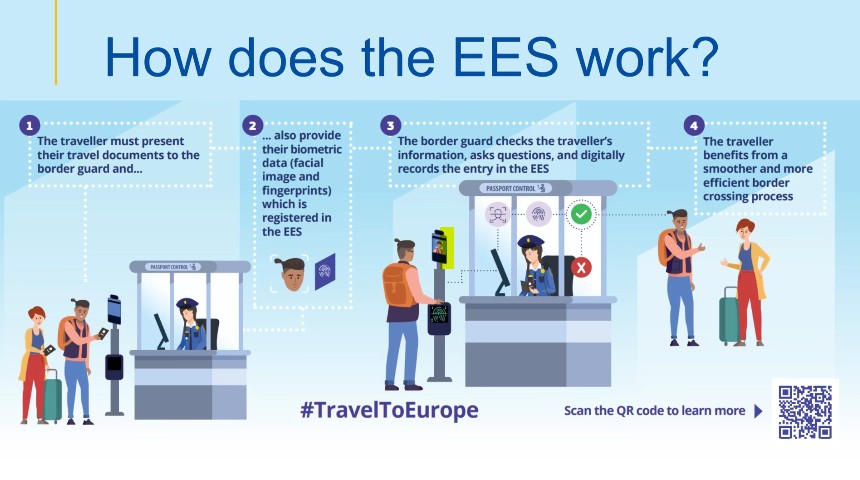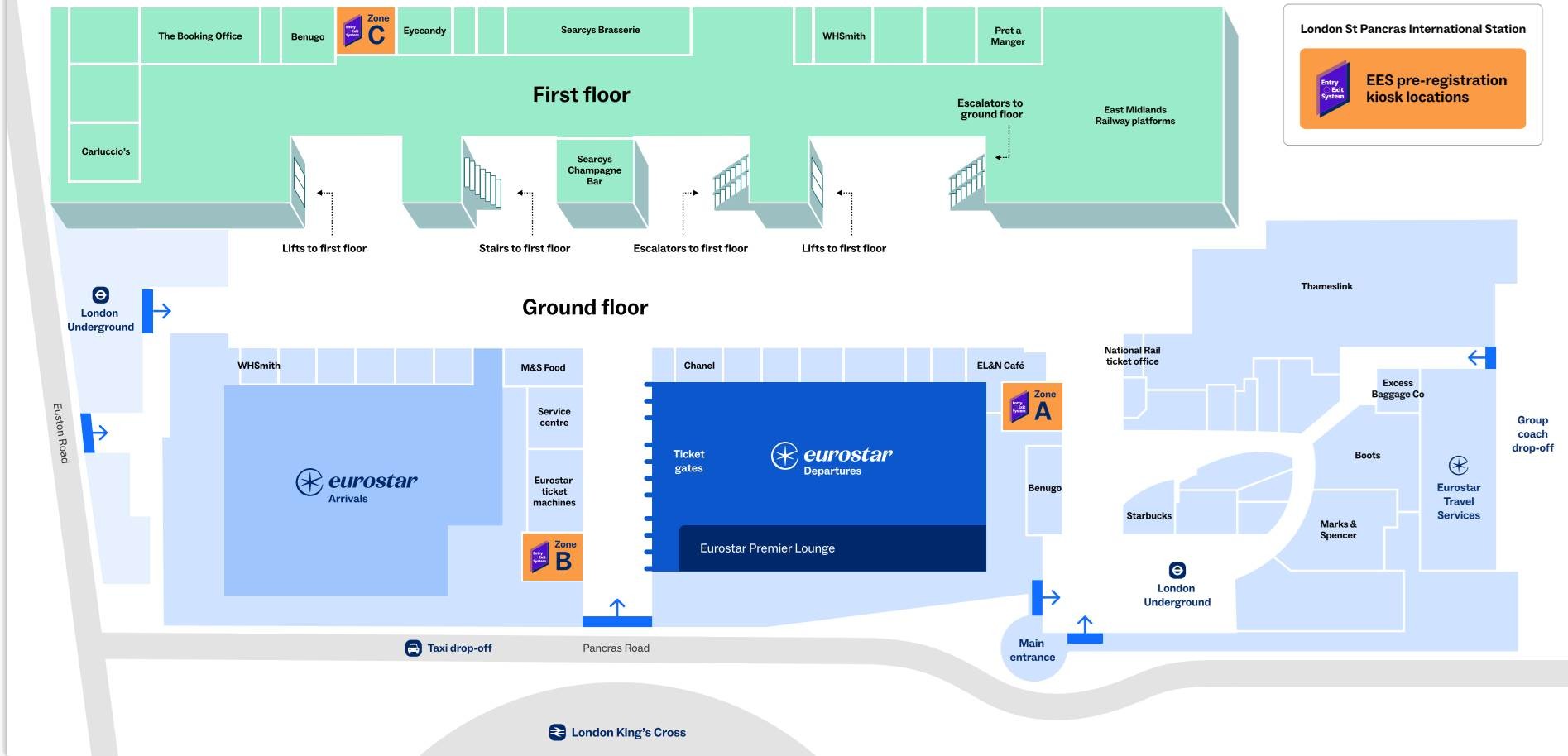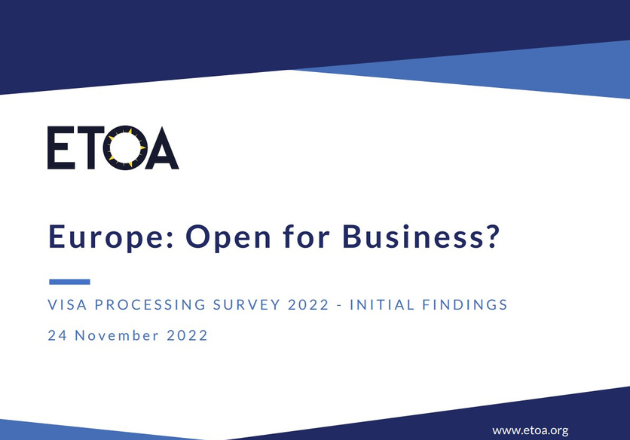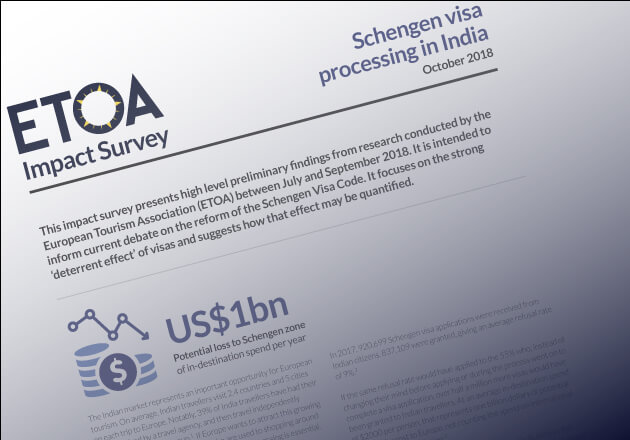Last updated 19 August 2025
Recent News
August 2025 | ETIAS; UK and EU youth mobility
- ETIAS: Frontex publish latest ETIAS information pack.
- EU/UK youth mobility: ABTA research in UK shows strong support for more initiatives to support youth mobility in travel and tourism.
July 2025 | EES and ETIAS
- EES implementation and start date: the European Commission announce that EES implementation will start on 12 October. Commission Press Release. More information. this follows the Council’s adoption of a new law allowing gradual implementation of EES over 180 days. Manual stamping of passports for non-EU/EFTA visitors to Schengen area will continue until the end of implementation period. Council Press Release. More information.
- ETIAS pricing: ETOA together with partner associations issue press release expressing concerns about proposed ETIAS price increase to 20 euros when the scheme comes into operation in 2026 unless clearer justification is provided and, if it goes ahead, a call to commit surplus revenue in support of sectoral interests. Official notification: Council Press Release. More information.
June 2025 | Snapshot of origin market perceptions of European visa facilitation in 2025 vs. 2022 based on ETOA’s latest survey available here.
May 2025 | Schengen visa policy – Official figures published on the number of Schengen visas issued and applied for in 2024.
April 2025 | UK ETA – EU/EFTA nationals (excluding Irish) require an ETA to travel to the UK unless exempt e.g. resident in UK.
March 2025 | UK Visa – The application fee for a short stay visitor visa will increase to £127 from 9 April 2025. Applications made before 9 April are £115.
Tourism depends on high quality visa facilitation and border processes to support economic growth and encourage demand, particularly from emerging visa-requiring markets. Pre-COVID-19 pandemic, Europe’s share of global international tourism arrivals was declining. Only c.15% of the EU’s visitors come from long-haul markets. The value of these visitors was missed, not least due to pattern of spend and seasonality. The export revenue represented by long-haul tourism is an integral part of the value of Europe’s visitor economy.
The appeal of non-European destinations will continue to grow. Maintaining Europe’s cross-border mobility requires political will as well as adequate infrastructure. ETOA is active on visa and border policy, from Schengen, UK and Ireland visa processing, to informing members on cross-border travel requirements both intra-European and from outside Europe.
ETOA’s policy objectives
- An objective assessment of risk allowing more countries to have visa-waiver (exempt) status
- Intelligent reform to Schengen visa code and national governments visa policy including development of e-visas
- Efficient and welcoming border processes, including travel documents and any health credentials required
What we are doing
- Inform members on cross-border travel requirements (more below)
- Conduct origin market surveys and publish reports (more below)
- Collaborate with industry partners including Tourism Manifesto alliance
- Work with European Commission, EU border agencies, European Parliament and national governments and parliaments
- ETOA is a member of the European Commission’s industry advisory group on ETIAS communication
- Respond to official inquiries on border-related issues, for example:
- ETOA submission (Jan 2024) to inquiry by UK Parliament House of Commons European Scrutiny Committee on impact of EES and the UK border
- ETOA submission (March 2024) to inquiry by UK Parliament House of Lords Justice and Home Affairs Committee on electronic border management systems (e.g. ETA). Committee letter setting out their conclusions and recommendations from the inquiry.
New border schemes
Operating in Europe | What you need to know
Schengen Area
The Schengen Area remains one of the EU’s great success stories. Borderless travel between 25 EU and 4 non-EU states (EFTA) has transformed the offer of multi-country itineraries enjoyed by long-haul visitors in particular. The introduction of the Entry/Exit System (EES) and European Travel Information and Authorisation System (ETIAS) is part of a long term strategy for the Schengen Area. Information on the new schemes can be found below.
29 Countries are in the Schengen Area – Austria, Belgium, Bulgaria, Croatia, Czech Republic, Denmark, Estonia, Finland, France, Germany, Greece, Hungary, Iceland, Italy, Latvia, Liechtenstein, Lithuania, Luxembourg, Malta, Netherlands, Norway, Poland, Portugal, Romania, Slovakia, Slovenia, Spain, Sweden, Switzerland.
If there is a serious threat to public policy or internal security (i.e. a pandemic), a Schengen country may exceptionally temporarily reintroduce internal border controls but is required to notify the European Commission (list of current internal border controls). In 2024, the European Council and Parliament agreed to update the Schengen Borders Code on when member states can reintroduce controls (and for how long) as well as a unified approach at the Schengen external border in the event of a health crisis.
For further information and latest news on Schengen border policy see European Commission (DG Home)
The EU is committed to further reform, including digitalisation of the Schengen visa process by all Schengen member states (see below), and has established a common visa policy (Schengen visa) for visitors to the Schengen Area not exceeding 90 days in a rolling 180 day period (short stay). Visa policy for visits exceeding 90 days in a rolling 180 day period remain subject to national procedures. To help calculate remaining time permitted in the Schengen Area, see here.
Annex II – List of countries whose nationals are not required to obtain a Schengen visa (‘visa-waiver/exempt’)
Annex I – List of countries whose nationals are required to obtain a Schengen visa.
The cost of a Schengen visa is generally €90 per person aged 12 and above. Further information here.
In certain cases, nationals of countries listed in Annex I are exempt from the Schengen visa requirement as a member state can implement derogations. For example, nationals of a third country listed in Annex I, residing in a country listed in Annex II, travelling as part of a school trip.
School trip visa exemption: For information on which EU/EFTA member states apply this derogation, see Article 6 (2.1) in the derogations spreadsheet found in the section ‘Countries whose nationals require a visa‘.
Statistics: Number of visa applications and issuance by each Schengen member state (+ Cyprus) including by consulate (press release for 2024)
Schengen Visa Digitalisation
From 2028, it is anticipated that a single EU online visa application platform will become operational to unify the Schengen visa application procedure. The platform will enable visa requiring nationals to apply for a Schengen visa online, regardless of the Schengen country they would like to visit. Due to a 7 year transition period, it may not be until 2035 when all Schengen member states have joined the platform. Appearing in person at the consulate would only be mandatory for first time applicants for the collection of biometric identifiers, for applicants whose biometric data are no longer valid or those with a new travel document.
The Schengen visa will also be digitalised (replacing the current visa sticker with a cryptographically signed barcode) and introduced when the platform becomes operational.
European Commission summary of the new rules/process
The new rules were adopted by the European Council in November 2023, after a legislative proposal from the European Commission in April 2022, and agreed with the European Parliament in June 2023.
‘EU Digital Travel Application’
In October 2024, the European Commission adopted proposals to digitalise travel documents (passport and EU ID cards) for travellers to use entering/leaving the Schengen Area. The European Council and Parliament are now discussing whether to agree to the proposals before they can be implemented.
The proposals include the development of an ‘EU Digital Travel Application’ that will be voluntary and free to use by all travellers (EU and non-EU nationals) to store their travel document(s). The app is anticipated to be available from 2030. In the meantime, Schengen member states would be allowed to implement national systems for using digital documents at their borders before the ‘EU Digital Travel application’ is ready for use.
Cyprus has applied to join the Schengen Area and is applying parts of the Schengen acquis such as on external border policy (i.e. 90 days in rolling 180 day period). In 2023, the European Commission evaluation process started to assess the readiness of Cyprus to join the Schengen Area and is ongoing.
Ireland maintains an opt-out from joining the Schengen Area and does not participate in the Schengen acquis on external border policy (i.e. 90 days in rolling 180 day period). However, Ireland does participate in the Schengen acquis related to the Schengen Information System, police and judicial cooperation. For information on visiting Ireland and travel between Ireland and the UK, see below.
For entering Schengen Area (and Cyprus)
- issue date within 10 years on intended date of arrival
- expiry date at least 3 months after intended leaving date
For entering Ireland see below.
Upcoming new border schemes
EES will implemented on a progressive basis from 12 October 2025, the Commission announced on 30th July. ETIAS is planned to start in Q4 2026. EES and ETIAS will affect non-EU/non-EFTA nationals visiting the Schengen Area (also Cyprus for ETIAS only). Implementation dates for both have been subject to revision, partly due to lack of readiness of border infrastructure and resilience of the IT software. Please monitor this webpage for updates on start date(s).
On 18th July the European Council adopted a new law allowing gradual implementation of EES over 180 days. Manual stamping of passports for non-EU/EFTA visitors to Schengen area will continue until the end of implementation period. More information in Council Press Release.
The European Commission has also published an explainer on the difference between EES and ETIAS.
Note: As for visas and ETIAS, navigating EES successfully is not a permission to enter, it is a pre-condition for entry. Border officials retain discretion as to what questions they ask about purpose of visit, proof of arrangements, funds etc., so visitors are advised to have relevant information to hand. Schengen member states and other European countries retain exclusive competence for their border integrity, processes and infrastructure, irrespective of EU-mandated policies and systems for the Schengen area.
Official website: European Commission EES webpage
Official communication resources: ‘Carrier information pack‘ (August 2024) – materials (posters/leaflets) to help inform travellers expected to be published closer to start date.
Introduction
EES is an automated IT system to register third country (non-EU/non-EFTA) nationals visiting the Schengen Area for short stay (max 90 in 180 days), both visa-exempt and visa-requiring.
Key Information
Start date: 12 October 2025, with full implementation in April 2026. See below in this text box for information on the 6-month progressive implementation period.
Countries implementing: Schengen Area (29 countries). See section below for EES implementation: UK outbound
Countries (EU) not implementing: Cyprus and Ireland
Applicable to: third country (non-EU/non-EFTA) nationals visiting for short stay (max 90 in 180 days), both visa-exempt and visa-requiring, of all ages although collection of biometric data varies by age. See question 1 in FAQs for exemptions.
System: EES will replace manual stamping in a passport (once EES is fully implemented – planned in April 2026). The system will also collect biometric data:
Age 12 and above – facial image and/or fingerprints
Under 12 – facial image
Cost: Free
How to apply: Not required in advance of travel as the process takes place on arrival, although an optional mobile app may be used in advance depending on port of entry. The process collecting the biometric data at the port of entry may vary between a booth or tablet.
For frequent visitors, see information on National Facilitation Programmes.
Mobile app: If permitted at the port of entry, a person may upload their facial image in advance (but not fingerprints) through a mobile app to speed up processing at border control. Information (video) on the mobile app prototype developed by FRONTEX for implementing countries to use.
Validity: Personal data collected is stored for 3 years and one day after leaving the Schengen Area for majority of third country nationals. When re-entering the Schengen Area and data on file is still stored and valid, new biometric data is not required to be collected.
Temporary Suspension of EES: For up to 60 days after the end of the 6-month progressive start of operation, implementing countries can decide to waive the collection of biometric data during peak travel times for a maximum 6 hours. The border waiting time before this measure is used could vary between countries and in specific circumstances may be extended by a further 60 days.
180-day progressive implementation period
On 18th July 2025 the European Council adopted a new law allowing gradual implementation of EES over 180 days. Manual stamping of passports for non-EU/EFTA visitors to Schengen area will continue until the end of implementation period. More information in Council Press Release.

Eurostar – procedures in London
With thanks to our member and partner Eurostar, content below is adapted from their August 2025 communication to their B2B partners:
What does this EES mean for Eurostar travellers?
Introduction of EES checks will be gradual. Not all travellers will be required to register immediately, and travellers will not need to do anything differently.
From 12th October, we will introduce entry checks for some travellers departing from London St Pancras International. Registration (for first-time travel) and checks (for subsequent journeys) will be carried out manually at a French immigration booth, during the usual passport control process. Staff will be on hand to guide travellers. Passport stamping will continue during the 6 months phased launch.
We will also open some of our new EES kiosks at London St Pancras International. From 12th October, travellers with Carte Blanche or Etoile Club Eurostar status, or with a Eurostar Premier ticket, will be invited to register their data at kiosks located in front of Eurostar Premier check-in (Zone B in map below, also available here). Registration needs to be completed manually at an immigration booth the first time they travel, but for subsequent journeys, this will enable travellers to save time and use the passport e-gates (where applicable). 
When will EES be fully introduced?
In line with EU requirements, EES will be fully introduced for all eligible Eurostar travellers by 10th April 2026.
From early 2026, we will introduce entry and exit checks on all routes to/from London, and kiosks will be available to all travellers departing from London and Paris. More details on specific processes for each station and type of traveller will be shared later in the year.
We want to reassure travellers that check-in times will stay the same. Our processes have been designed with customers in mind, to ensure minimal impact to their journey. While EES is introduced, we will provide clear signage in stations and staff will be present for extra support.
More information
We have prepared this FAQ to give more information about these new processes.
Official public information pack: FRONTEX latest information pack (August 2025)
Official website (including how to apply when launched): European Commission ETIAS webpage
ETOA additional resources on topic:
- ETIAS & UK ETA summary table showing key similarities and differences between the travel authorisation schemes
Introduction
ETIAS is a travel authorisation permit that will be required to visit the Schengen Area or Cyprus for third country nationals (non-EU/non-EFTA) who do not require a Schengen/Cyprus visa (Annex II). For example, British (UK), Japan, USA.
Key Information
Start date (target): Q4 2026 (specific date to be announced)
Countries implementing: Schengen Area + Cyprus (30 countries)
Countries (EU) not implementing: Ireland
Applicable to: Third country (non-EU/non-EFTA) nationals of countries with Schengen visa-waiver/exempt status (Annex II). The same start date is planned for all applicable nationalities and there will be a transition and grace period to help with implementation.
Transition period: For at least 6 months from start date, an ETIAS permit will not be a requirement (including for multiple entries during this time).
Grace period: After the transition period, there will also be a grace period of at least 6 months, whereby a person on their first visit to a country implementing ETIAS since the end of ETIAS transition period will not be required to have an ETIAS permit.
Cost: on 17 July 2025, the European Commission proposed raising the fee from €7 to €20 per person aged 18-70 years old at time of application (under 18 and over 70 still need to apply even though free). Family member of an EU/EFTA national (of all ages) are exempt from payment travelling to a country that is not of their family member’s nationality. The increase will go ahead unless Council or Parliament object within two months, or within a further two months if an extension is requested by either of the co-legislators.
On 24 July 2025, ETOA together with partner associations issued press release expressing concerns about proposed ETIAS price increase. The stated reason for the increase is cost inflation for the scheme’s operation since the enabling legislation was published in 2018 (with the seven euro fee being agreed years before then). However, alignment with other countries with travel authorisation programmes is also given as grounds for change. This purpose is not anticipated by the legislation.
For regulatory basis of fee and any changes, see EU 2018/1240 articles 18, 85, 89. See also Pricing Policy below.
Validity: 3 years or until expiration of travel document i.e. passport, whichever is sooner, from ETIAS issue date. Multiple entries will be permitted during period of validity. A standard ETIAS travel authorisation will allow travel to all countries that have implemented ETIAS and will be linked to the travel document i.e. passport.
Transiting: An ETIAS will not be required when transiting the countries implementing and remain in international transit area.
Exemptions: Third country nationals resident within the Schengen Area or Cyprus. Third country nationals resident in Ireland are not exempt (except British nationals resident in Ireland before 1 January 2021). Information on exemptions.
Application process
One application per person (no group booking option)
How to apply (not yet launched): Will be required to receive ETIAS permit in advance of travel; apply either via ETIAS mobile app (in development) or European Commission ETIAS webpage.
Decision on application expected to be less than 1 day (but may take up to 4 days and in some cases up to 30 days)
Third parties e.g. tour operators will be permitted to apply on behalf of a traveller with a declaration of representation, although for children application will need to be submitted by a person exercising permanent/temporary parental authority or legal guardianship.
The third party will be required to upload a copy of the signed declaration to the application form (the declaration can be in English, French, German, or in the official language of the country of which the traveller is a national).
Either ETIAS mobile app or online form will be able to be used to apply.
Additional information
Dual nationals and multiple passports: A person with two passports both from a third country (non-EU/non-EFTA) will be required to apply for an ETIAS linked to one of their passports. Applying for an ETIAS for each passport will not be permitted.
School trips: ETIAS will be required by nationals of a third country listed in Annex I, residing in a country listed in Annex II, travelling as part of a school trip where a visa is not required. For information on which EU/EFTA member states apply the school trip visa exemption, see Article 6 (2.1) in the derogations spreadsheet found in the section ‘Visa requirements for third countries‘.
Pricing policy: Unlike the USA equivalent (ESTA), the revenue was not intended contribute to tourism promotion. Following strong representation from industry, the fee was set at a level to cover costs including development of land border infrastructure as well as the system itself. ETOA and other associations took the view that seeking profit would penalise those who had chosen to visit Europe, and that promotion should be funded in other ways. However, the announcement of an increase to 20 euros in July 2025 calls this rationale into question.
Inaccurate information online: Some confusion about scope and operation has arisen due to the proliferation of unofficial websites with URLs containing either Schengen or ETIAS. The official website should always be consulted. European Commission ETIAS webpage.
Ireland and United Kingdom
Ireland and the UK (England, Northern Ireland, Scotland and Wales) have a Common Travel Area (CTA) whose operation is unaffected by the UK’s departure from the EU allowing free movement for British and Irish nationals within the CTA. The CTA includes the Channel Islands and Isle of Man.
For non-British/non-Irish nationals the maximum length of time permitted to visit differs between Ireland (90 days) and the UK (6 months).
Further information
Irish Government – visiting (including visa requirements) | news and updates
UK Government – visiting (including visa requirements) | border entry process | news and communications
While there is a different time limit for visiting Ireland (90 days) and the UK (6 months), there is common visa policy between Ireland and the UK for certain nationalities such as the British Irish visa scheme for Chinese and Indian nationals. This scheme allows travel in Ireland and the UK for Chinese and Indian nationals on a single visa (either issued by Ireland or UK, usually the country of first arrival). Ireland also has a short-stay visa waiver programme that exempts nationals of certain countries who have a UK visa from needing an Irish visa when in Ireland (this programme is not reciprocated by UK Government).
The cost of a UK short stay visitor visa is generally £127. Other visa fees can be found here.
The cost of an Ireland short stay ‘C’ visitor visa is generally €60.
For entering Ireland – expiry date after intended leaving date
For entering UK – expiry date after intended leaving date
British and Irish nationals are advised to carry valid ID documentation travelling between Ireland and the UK (transport carriers may require ID document to be a passport).
Since 1 October 2021, the EU List of Travellers Scheme has ended for school trips from the EU to the UK. As a result, children of UK visa requiring nationality now require a visa to visit the UK (except on a school trip from France). In addition, EU ID cards are no longer accepted for most visitors and a passport is required (unless exempt or a child on a school trip from France).
Security of new EU ID cards is improving following European Commission regulation in August 2021. ETOA has been campaigning with other industry associations for UK Government to re-instate acceptance of EU ID cards for children under 18, as well as waiving the need for a UK visa for children of visa-requiring nationality on EU/EFTA school trips to the UK. The UK-France Joint Leaders’ Declaration in March 2023 committing to making changes to documentary requirements for children on a school trip from France is welcome, however bilateral agreements of a similar kind with other EU member states have not been announced to date.
School trip from France
From 28 December 2023, documentary requirements entering the UK have changed for children aged 18 or less on a school trip from France (with 5 or more pupils) whereby:
- an EU ID card is accepted for entry instead of a passport
- children of visa requiring nationality do not require a UK visitor visa
These changes are only permitted if a France-UK School Trip Travel Information Form has been completed (further information on the process). A passport is still required for adults supervising the children.
When travelling between Ireland and Northern Ireland, there are no immigration controls on the land border, but a person needs to check if a Irish/UK visa is required for their nationality in either country.
For nationalities who do not require a UK visa, a travel authorisation permit (UK ETA) is/will be required in Northern Ireland (start date varies by nationality). This includes arriving into Northern Ireland from Ireland unless resident in Ireland.
New UK border scheme
Official website (including how to apply online or download app): UK Government ETA webpage
Further information: Immigration Rules Appendix
UK Government communication resources:
- Stakeholder pack including General Factsheet (English | Other languages) and Northern Ireland Factsheet (English)
- Videos – What is an ETA | How to apply
ETOA additional resources on topic:
- ETIAS & UK ETA summary table showing key similarities and differences between the travel authorisation schemes
- Webinar with UK Government held on 2 December 2024
- Summary results of ETOA impact survey in January 2025 to assess potential impact of the UK ETA on tourism in Northern Ireland completed by tour operators/DMCs.
Introduction
An ETA is required to travel to the UK (including landside transiting i.e. pass through UK border control) for all nationalities who do not require a visa to visit the UK e.g. EU/EFTA (excluding Ireland), Japan, Canada and USA.
British and Irish nationals do not require an ETA.
Please note the UK ETA is separate to the forthcoming ETA anticipated to be implemented in late 2025 / early 2026 by the three British Crown Dependencies (CDs) – Jersey, Guernsey and Isle of Man. However, a UK ETA will be accepted travelling to the CDs and a separate CD ETA will not be required.
Key Information
Start date: in force for all visa-exempt nationalities
Implementing countries: United Kingdom (England, Northern Ireland, Scotland and Wales)
Applicable to: non-British/non-Irish nationals visiting the UK, who do not require a UK visa. This includes arriving into Northern Ireland from Ireland unless resident in Ireland, and landside transiting i.e. pass through UK border control.
Cost: £16 per person (payable by all ages). The revenue is used to cover costs and invest in the UK border system.
Validity: 2 years or until expiration of travel document i.e. passport, whichever is sooner, from ETA issue date. Multiple entries are permitted during period of validity. An ETA allows travel to all countries in the UK and is linked to the travel document i.e. passport.
Transiting: An ETA is no longer required when transiting the UK and remain in international transit area (effective 16 January 2025). Only the UK airports – London Heathrow and Manchester have an international transit area where a traveller does not pass through UK border control connecting flights outside UK/Ireland. Further information (London Heathrow | Manchester)
Exemptions:
- Non-British/non-Irish nationals resident in Ireland who do not require a UK visitor visa are exempt when travelling to the UK (Great Britain and Northern Ireland) from Ireland or elsewhere in the Common Travel Area (CTA). An ETA is required when travelling to/via the UK from outside the CTA. To prove residency in Ireland, these documents are accepted.
- Children on school trips from France under the agreed scheme (adults supervising the children still need to apply for an ETA if their nationality is visa-exempt).
Application process
One application per person (no group booking option)
Application process: A passport is required to apply for an ETA (an EU ID card can not be used). Apply either via ETA mobile app or online (process differs between mobile app and online form as facial biometric collected for ages 10+ using the mobile app).
UK Government estimate completion time to be 10 minutes per application. An application can not be saved and returned to a later time.
Decision on application is commonly received within minutes (but may take up to 3 days).
Third parties e.g. tour operators are permitted to apply on behalf of a traveller. Either ETA mobile or online form can be used (although applications should be made online where the traveller is not present with the third party). A letter of authorisation is not required to be uploaded with the application.
Additional information
Multiple passports: An ETA is linked to each passport and therefore a person can have more than one ETA valid at the same time.
Dual nationals: A person with a British or Irish passport should travel using this passport to demonstrate they do not need an ETA. A US national who also has British/Irish nationality travelling from the USA should use their US passport for check-in but present their British/Irish passport to the carrier for boarding.
China outbound : Group Visas for Europe
There are schemes for group visas from China to Schengen and UK, whose smooth operation depends on continued collaboration. The requirements are available below:
A 2018 briefing note is available here. Note that it was written prior to the UK’s departure from the EU, so the operations of the schemes may diverge, but the principals remain the same.
ETOA Visa Impact Surveys and Reports
ETOA conducts origin market surveys with its members and publishes reports assessing current impact of Schengen, Ireland and UK visa processing. Its results help ETOA and policy makers map current problems and identify good practice: poor visa processing costs Europe valuable business.
Chart showing relative progress of European visa facilitation 2022 – 2025 as perceived by outbound Asian markets is available here.
Presentation from our visa processing survey in autumn 2022 focusing on Asian origin markets can be found below. Findings suggest that Schengen Area countries as well as Ireland and UK need to improve service standards to avoid deterring high-spending Asian visitors.
Disclaimer: While best efforts have been made to verify the accuracy of the information, the information displayed on this page should be used as guidance only.





